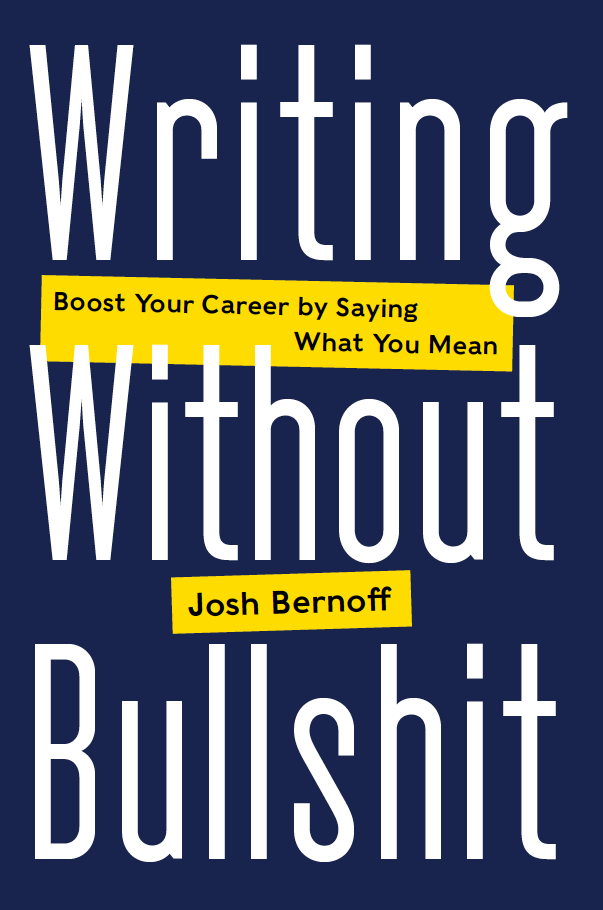10 easy New Year’s resolutions for writers in 2017

Want to write better? Change a writing habit. Here are ten ways to be a better writer: pick one, then stick with it. (Tell me which one you picked in the comments.)
1. Stop sending first-draft emails.
Most of what you write is email. While it creates the biggest impression in aggregate, you’re not spending enough time on it.
To improve email quality, use smartphones only for replies and forwards; compose new emails on a computer. And before sending, review, delete unneeded digressions, reorganize, add bullets or headings, and trim to 250 words maximum.
Master this habit and you’ll impress people with your boldness and effectiveness.
2. Delete your warmup paragraphs.
This is the easiest fix to make your writing shorter and punchier.
We all tend to take a few paragraphs to get going, no matter what we write. That’s fine. But there’s no reason to make readers read them.
Before finishing a draft, go back to the beginning and cut the first paragraph. If you don’t need it, cut the new first paragraph. Continue until the opening paragraph actually says something.
It’s an easy habit to get into. Your readers, finding real content in the first paragraph, will be more likely to keep reading. Do this enough times, and you’ll learn to stop writing those wasteful paragraphs altogether.
3. Embrace “you” and “we.”
There’s no easier trick to making your writing more direct than embracing pronouns.
Stop talking about “customers” or “fellow employees.” Start talking directly to your audience with “you” and refer to your organization as “we.”
Before: “As this document shows, the organization’s commitment to customer service is paramount.”
After: “We will serve you better, and here’s how.”
To get into this habit, visualize your audience: put a picture of a customer, a worker, or one of your direct reports by your monitor as you write. Then write to that audience. Your writing will become shorter, you’ll use more active verbs, and you’ll make a better connection with your audience.
4. Recognize and replace the jargon that’s your “binky.”

We all have words we love to toss around to sound more sophisticated. What’s yours? “Cloud-based,” “governance,” “optimization”?
To start 2017, sit down with a few of your recent documents and a highlighter. Then read them and highlight the jargon words that an intelligent person not familiar with your field — a spouse or sibling, for example — would read and say “what the heck is that?”
These words are your binky — the pacifier that you suck on to feel secure. And you’re too old for a binky.
Write five or six synonyms for each in terms that anyone in your audience will understand. And next time you write, search for your binky words and replace them before sharing the draft.
You’ve just found an easy way to boost your readers’ understanding.
5. Become a weasel hunter.
Weasel words like “very,” “incredibly,” “huge,” “most,” and “often” creep into your language. Individually, each one seems to make things better, by intensifying what you think is good or qualifying what you worry is wrong. But taken together, they undermine your writing. Here’s an example, from Marissa Meyer’s email about Verizon buying Yahoo.
[O]ur incredibly loyal and dedicated employee base has stepped up to every challenge along the way. Through the first half of the year, we met our operational goals and overachieved on plan. But, further, there are things that you cannot measure, like the passion of the people behind the products. The teams here have not only built incredible products and technologies, but have built Yahoo into one of the most iconic, and universally well-liked companies in the world.
Develop your weasel detector. Identify weasel words in what you’ve written, and delete as many as possible. Replace with precise statistics or statements without qualifiers.
Especially for PR people, weasel words are a crutch that undermines sincerity. Give ’em a rest.
6. Become obsessed with headlines and subject lines.

Your titles, more than anything else, determine who reads what you write. Are you spending enough time on them?
I’m talking about blog titles, email subject lines, and document titles. Are yours bland, or worse yet, are they clickbaity?
To write great titles and subject lines, write them before you start to write anything. Then when you’ve finished, go back and rewrite them. That way you’ll spend at least twice as much time on the title as on any sentence in the rest of the text.
A great title is descriptive and catchy — it makes a promise that the rest of the text delivers on. Vow that you’ll make yours great in 2017.
7. Be paranoid early.
Everybody suffers from anxiety and fear as a deadline approaches, when it’s typically too late to do anything.
A smart writer gets paranoid at the beginning of the writing process.
When you start writing, worry. Do you have enough research? Where will you get more? Do you have time to set up an interview with that busy and important person whose insights you need? Where will you get the statistics and support you need for your arguments? Have you lined up reviewers? Do you have a good editor that you can trust?
Get paranoid early. Then act on your fears. Unlike late fear, which only makes you crazy, early fear creates action that will actually make your writing better.
Make a resolution to start every project in 2017 with productive paranoia.
8. Get persnickety about review discipline.
Reviews destroy writing. Random, late reviews can turn any piece of writing into mush. And as much as you want to blame your reviewers, it’s your fault.
Only 32% of business writers in the WOBS Writing Survey said that their process for collecting and combining reviews was effective.
Promise yourself that, starting with the first project of 2017, you’ll fix this.
When you start a project, line up reviewers. Prepare them for what’s coming and when, and what you expect from them. Hit your deadline, then insist that they hit theirs.
And when the time comes to address those reviews, don’t just do what they ask. Figure out what problem they found, and then use your writing intelligence to fix it without destroying the soul of your document.
A fanatical discipline about reviews will keep your writing coherent and clear. Promise yourself that you’ll do this for every big document you write next year. Stick to it and your results will be way better than last year’s.
9. Go from editor to teacher.
You’re a great writer. People come to you for help. Are you helping them, or just their documents?
It’s so tempting to just fix everything in a document. The markup features in Microsoft Word and Google Docs make it effortless. Then you just send the marked up document back to the writer who, depending on their mood, either accepts all the changes or rejects them all.
You’ve just gotten yourself a permanent job as a document repair tech.
Instead, take each correction as an opportunity to teach. Figure out why the writer makes these mistakes. Suggest solutions, don’t just write them. Send it back with a cover memo that suggests ways to improve. And if at all possible, have a 30-minute conversation with the writer about how those suggestions will make them better.
In 2017, make writers better. They’ll love you for it, and you’ll have less to correct the next time they write something.
10. Write to create action, or don’t write at all.
Every time you write something, ask, “what do I want the reader to do?”
If the answer is “I don’t know,” or “Nothing,” then delete, don’t send, don’t publish.
Business writing exists for one purpose: to create a change in the reader. So don’t waste time writing anything that creates no change.
Do this for every document, and your year will be a lot more productive.
—
If you like these tips, you’ll like the book they came from: Writing Without Bullshit. Get yourself a copy!

Amen, Josh! Mine is #6 – in fact I wrote a post about it a few months back! http://www.nonprofitcopywriter.com/weasel-words.html
1. I never do this. Every one is written, checked, edited, rewritten, then sent.
2. I’m guilty of ‘warm up paragraph syndrome’. This is my pick out of the 10.
3. I’m all over of this. Apparently, ‘you’ should appear three times more than ‘I’ or ‘we’ in any copy.
4. I’m a firm believer of keeping it simple. I don’t do jargon.
5. I need to work on this.
6. The importance of these creates pressure to make them good. If I get stuck, I go here: http://coschedule.com/headline-analyzer
7. Productive paranoia – I like it!
8. Great advice. I’ll be doing more of this.
9. I do a bit of this already. Whenever I do, I always include notes.
10. I need to ensure more of this goes into my copy.
Editor to teacher: When reviewing, I dont use Word’s markup tools. For me it’s too hard to make sense of the updated document quickly. Here’s what I do instead: if the author’s with me, it’s a print with a red pen and lot’s of “why”. or if it’s by return email, a simple list of suggested edits, with whys included. It might make. ore work for the author, but will let them think through the changes.
I also have this question in the back of my mind when writing “what is the critical point you’re trying to convey?”
You always make me want to be a better writer. Thanks.
Sign me up for #5: weasel hunting. Reading WOBS has already made me aware of the problem; now I’m going to double down.